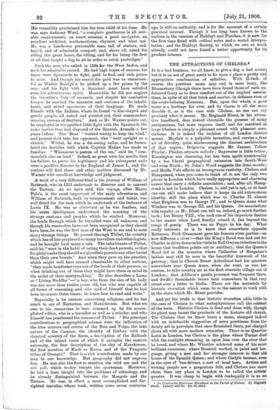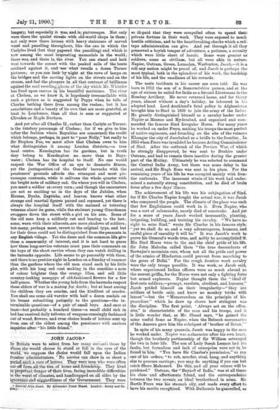THE ATTRACTIONS OF CHELSEA.* IT is a bad business, we
all know, to give a dog a bad name; but it is an sot of great merit to fix upon a place a pretty and
appropriate combination of syllables. With ill-luck, of course, the prettiest name may end in mere irony, like Bloomsbury (though there have been found those of such un- fettered fancy as to draw comfort out of the implied associa-
tions, in spite of all that brick and mortar, in defiance even of the overwhelming Museum). But, upon the whole, a good name is a heritage for ever, and its charm is all the more durable if, as is the case with Chelsea, no one can say precisely what it means. Mr. Reginald Blunt, in his attrac- tive handbook, does indeed chronicle the guesses of many antiquarians, but none imposes itself, and for mankind, at large Chelsea is simply a pleasant sound with pleasant asso- ciations. It is indeed the luckiest of all London district names. Mayfair is a palpable invention, and carries a faux air of frivolity, quite misbecoming the discreet architecture of that region; Belgravia suggests Mr. Jeames Yellow Pluche ; Pimlico attracts nobody ; Bayswater is little better; Kensington was charming, but has been spoilt irretrievably by a too liberal geographical extension into South-West and even North; St. John's Wood suggests the demi-monde ; and Maida Vale affects an incongruous rusticity. Chelsea and Hampstead, when you come to think of it, are the only two places in London which have really appropriate and charming names that carry a definite association; and, after all, Hamp- stead is not in London. Chelsea is, and yet is not, or at least one can still make believe that it keeps its old autonomous identity, still the place which was to Charles IL almost what Brighton was to George IV., and to Queen Anne what Windsor was to George III. and his Queen. Its associations with royalty, as Mr. Blunt can tell us, indeed, go much further back; but Henry VIII., who took one of his imperious fancies to the manor when Lord Sandys owned it, lies beyond the range of gossip. There was no Pepys in his day. What really interests us is to know that somewhere opposite Battersea Park Grammont gave his famous river parties—on how different a river !--that the King's Road was laid out for Charles to drive down on his visits to Nell Gwynn (whether to the house that tradition points out or another) ; that the Queen's Road led to the mansion where Catherine of Braganza's initials may' still be seen in the beautiful ironwork of the gateway ; that in Church Street Arbuthnot had his quarters somewhere near Queen Anne, when she went, as was her custom, to take country air at the first riverside village out of London; that Addison's gentle presence was frequent there, and Swift's formidable brows bent somewhere in that very street over a letter to Stella. These are the materials for historic evocation which seem to us the easiest to work with in the store which Mr. Blunt provides.
And yet the truth is that historic evocation adds little in the case of Chelsea to what metaphysicians can the content of the term. Historic Chelsea is dead and done with, though its ghost may haunt the precincts of the historic old church. The Chelsea that we know bears a name, stamped indeed with an indefinable suggestion of mere prettiness from the dainty art in porcelain that once flourished there, yet charged above all with more modern memories. There is no Quartier Latin in London, but Chelsea is the place where Turner died with the sunlight streaming in upon him over the river that he loved, and where Mr. Whistler achieved some of his most brilliant successes; where Rossetti worked, in paint and lan- guage, giving a new and far; stronger interest to that old house of the Spanish Queen; and where Carlyle became, even in the eyes of 'bus-drivers, a sort of local hero. Artiste and writing people are a gregarious folk, and Chelsea has more claim than any place in London to be called the artists' quarter. It was cheap to begin with (unhappily it is so no 9 An Illustrated Historical Handbook to the Parish of Chelsea. By Reginald Blunt. Lamley and Co. [2s. ed. net.1 longer); but especially it was, and is; picturesqve. Not . only were there. the quaint streets with oldavorld shops in them; not only were there houses with heavy staircases of carved wood and, panelling throughout, like the one in which the Carlyles lived (but they. papered the panelling) and which is now among the • most interesting memorials in the world; there watt, and there is, the river. You can stand and look west towards the sunset with the peaked sails of the boats outlined against it, and—tee—what recalls a dozen Turner pictures; or you pear look-by-night -at the rows of lamps on the bridges and the moving lights 013, the streateand.on the stream, and-feel the pleaattre in. all that contrast "of .brilliance against the cool receding7gloom. of the -sky WhiCh Mr. Whistler has fixed upon canvas in his beautiful nocturnes. The river at Chelsea, as we know it, is hopelessly irreconcilable with such a picture as is suggested by Pepys when he tells of Charles bathing there from among the rushes; but it has associations and a- beauty of its own that are more grateful, at least , to Londoners,. than all that. is seen or suggested at Cliveden or Maple Durham.
And yet after all Chatles II., rather than Carlyle or Turner, is the tutelary personage of Chelsea; for if we give to him (after the fashion where Royalties are concerned) the credit which belongs, perhaps', in part to "poor Melly," but really to Sir Stephen _Fox, we must allow that Chelsea owes-to him what distinguishes it . among London districts,—a true local centre. Kensington has its .gardens, but in truth they belong to Kendingicin. '330 more than to Bays- water4. Chelsea has its. hospital to itself. No one would gaped the War Office of RIC eye to dramatic fitness, yet the juxtaposition tof -the Guards' barracks with the pensioners' grounds affords . the- strangest and most :pic- turesque contrasts,- while -it enlivens the whole quarter with the bright note of military red.:. Ge.where you will in Chelsea, you meet a soldier• atrevely turn; :and though the encounters are not so exciting 'atsl in the days of the Jubilee, when Muses, Dyaks, Zaptiehs, and heaven knows what other strange and martial' figures 'patted and. repassed, yet there is always the hospital itself with the - maimed or tottering veterans about its gates, while the stalwart young Guardsman swaggers down the street with a girl on his arm, Some of the old men keen.a, soldierly cut and -bearing to the last; some, worn with their aidmentasare mere shadows of soldiers; but-many, perhapp most, revertsto the original- type, and but for their dress could not be distinguished from the peasants in any English village. - Yet-thadaress and-the common-life-give them a community of interest; and it is not hard to guess how these long-service veterans must peas their comments on the boys of the -short service whom they- can watch drilling in the barracks opposite. Life seems to go peaceably with them, and there is no prettier sight in London on a Sunday of summer than the gardens where the - old men stand each by his little plot, with hie long red coat making in the sunshine a note of colour brighter - than the orange. lilies; and sell little country-looking nosegays of old-fashioned flowers for a- few half .pence. Whether the yousig lads from the barracks respect these elders of war is a matter for doubt ; but at least among the children they are oracles, and the kindliest of oracles. Ion shall-see some old warrior with half a dozen medals on his. breast submitting patitutly to the questions—the in- terminable questions—of a pair- of small boys. And once at least—but probably a hundred times—a small and sick in bed has received daily tributes of weapons cunningly fashioned out of wood, flowers, and even choice heads of lettuce sent up from one Of the oldest among the pensioners with anxious in4Wries after "his little friend.", _ •



































 Previous page
Previous page